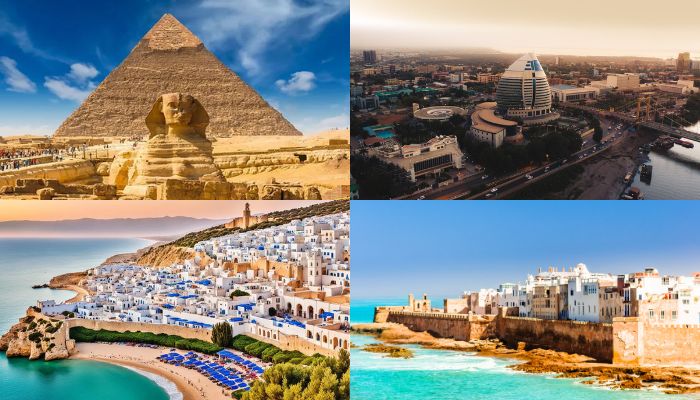
Oldest Country in Africa: A Historical Journey
Africa, the cradle of human civilization, has a rich tapestry of ancient nations. When discussing the oldest country in Africa, we must delve deep into the continent's fascinating history to uncover this remarkable story.
What Makes a Country the Oldest Country in Africa?
Determining the oldest country in Africa requires careful consideration of several historical factors:
- Continuous Governance: The nation must have maintained some form of consistent governmental structure throughout its history, even if the specific form of government changed over time.
- Territorial Integrity: The country should have retained significant control over its historical territories, though borders may have shifted over centuries.
- Cultural Continuity: There must be a demonstrable continuation of cultural practices, traditions, and national identity from ancient times to the present.
Ethiopia: The Oldest Country in Africa
Ethiopia stands as the undisputed oldest country in Africa, with a history stretching back over 2,000 years. This ancient nation holds several distinctive characteristics that cement its position:
Historical Timeline of Ethiopia
- Pre-Axumite Period (1000 BCE - 100 CE): Early civilization development and establishment of trading networks
- Axumite Empire (100-940 CE): One of Africa's most powerful kingdoms and earliest Christian states
- Zagwe Dynasty (940-1270): Period of cultural and architectural advancement, including the famous rock-hewn churches
- Ethiopian Empire (1270-1974): Continuous imperial rule under the Solomonic Dynasty
For comprehensive insights into African history and art, visit blodarcyart, where you'll find detailed analyses of ancient African civilizations.
Factors Contributing to Ethiopia's Longevity
Geographic Independence
Ethiopia's unique geographical features played a crucial role in maintaining its independence:
- Highland Fortress: The mountainous terrain provided natural protection against invaders
- Strategic Location: Proximity to the Red Sea enabled trade while maintaining defensive positions
- Diverse Climate: Various ecological zones supported agricultural self-sufficiency
Cultural Resilience
Ethiopia's cultural strength has been paramount in maintaining its status as the oldest country in Africa:
- Religious Heritage: Early adoption of Christianity (4th century CE) provided cultural cohesion
- Indigenous Script: Development of the Ge'ez script enabled written history preservation
- Unique Calendar: Maintenance of its own calendar system, demonstrating cultural independence
Historical Achievements
Military Success
Ethiopia holds the distinction of being the only African nation to successfully resist European colonization during the Scramble for Africa:
- Battle of Adwa (1896): Decisive victory against Italian forces
- Maintained Independence: Preserved sovereignty throughout the colonial period
- Indigenous Military Traditions: Developed effective military strategies and maintained standing armies
Diplomatic Relations
As the oldest country in Africa, Ethiopia established important diplomatic connections:
- International Recognition: Early diplomatic relations with European powers
- League of Nations Membership: One of the first African members
- Pan-African Leadership: Significant role in African unity movements
Cultural Heritage
Religious Significance
Ethiopia's religious heritage contributes significantly to its status:
- Ancient Christian Tradition: One of the earliest Christian kingdoms
- Islamic Heritage: Peaceful coexistence with Muslim communities
- Jewish History: Home to Beta Israel community
Architectural Legacy
The country's architectural achievements demonstrate its advanced civilization:
- Rock-Hewn Churches of Lalibela: UNESCO World Heritage site
- Axum Obelisks: Ancient engineering masterpieces
- Palace Complexes: Royal compounds showcasing architectural sophistication
Modern Significance
Political Influence
As the oldest country in Africa, Ethiopia continues to play a vital role:
- African Union Headquarters: Located in Addis Ababa
- Regional Leadership: Important mediator in African affairs
- International Relations: Strong diplomatic presence globally
Cultural Impact
Ethiopia's influence extends beyond its borders:
- Coffee Culture: Birthplace of coffee cultivation
- Musical Traditions: Unique scales and instruments
- Literary Heritage: Rich tradition of written literature
Challenges and Preservation
Modern Challenges
Even as the oldest country in Africa, Ethiopia faces contemporary issues:
- Economic Development: Balancing tradition with modernization
- Environmental Conservation: Protecting historical sites
- Cultural Preservation: Maintaining ancient traditions in a modern world
Conservation Efforts
Numerous initiatives protect Ethiopia's heritage:
- UNESCO Programs: Multiple World Heritage sites protection
- Digital Preservation: Documentation of historical manuscripts
- Cultural Education: Programs teaching traditional practices
Future Prospects
Development Opportunities
Ethiopia's status as the oldest country in Africa provides unique advantages:
- Cultural Tourism: Growing interest in historical sites
- Traditional Knowledge: Valuable ancient practices and wisdom
- International Recognition: Strong diplomatic relationships
Sustainable Heritage
Maintaining historical legacy while embracing progress:
- Modern Infrastructure: Development respecting historical sites
- Cultural Innovation: Adapting traditions for contemporary relevance
- Educational Programs: Teaching history to new generations
Conclusion
Ethiopia's position as the oldest country in Africa represents more than just historical longevity. It embodies the resilience, cultural richness, and continuous evolution of African civilization. Understanding its journey helps appreciate the complex tapestry of African history and its significance in the modern world.
This ancient nation continues to demonstrate how historical preservation can coexist with modern development, providing valuable lessons for other nations. As Africa moves forward in the 21st century, Ethiopia's example as the oldest country in Africa serves as both inspiration and guidance for maintaining cultural identity while embracing progress.
